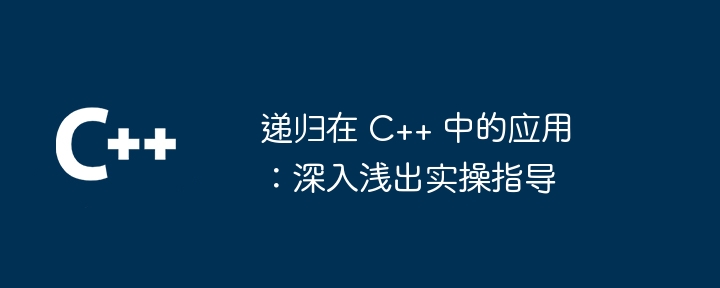
Recursion is a programming technique in which a function calls itself, suitable for divide and conquer problems. In C, a recursive function is defined as: returnType functionName(parameters), which requires a clear baseline (termination condition) and recursive call (calling itself after updating parameters). Factorial calculation is a classic case of recursion. The code is as follows: `cpplong factorial(int n) { if (n == 0) {return 1;} else {return n * factorial(n-1);}}

Application of recursion in C
Introduction
Recursion is a powerful programming technique , which allows functions to call themselves. It is often used to solve problems that have a divide-and-conquer nature, i.e. the problem can be broken down into smaller sub-problems that can be solved recursively.
Syntax
In C, recursive functions are defined using the following syntax:
returnType functionName(parameters) {
// 基线情况:当递归终止时要满足的条件
if (base_case) {
return result;
}
// 递归调用:函数调用自己,传入更新后的参数
return functionName(updated_parameters);
}Practical case: factorial
Finding the factorial of a non-negative integer is a classic example of recursion. Factorial is defined as:
factorial(n) = 1, if n = 0
= n * factorial(n-1), if n > 0The following code implements a recursive function to calculate factorial:
#include <iostream>
long factorial(int n) {
if (n == 0) {
return 1;
} else {
return n * factorial(n-1);
}
}
int main() {
int n;
std::cout << "Enter a non-negative integer: ";
std::cin >> n;
std::cout << "The factorial of " << n << " is: " << factorial(n) << std::endl;
return 0;
}Other applications
Recursion can also be used to solve various problems Problems, including:
Tip
The above is the detailed content of The application of recursion in C++: practical guidance in simple terms. For more information, please follow other related articles on the PHP Chinese website!
 What are the differences between c++ and c language
What are the differences between c++ and c language
 Recommended learning order for c++ and python
Recommended learning order for c++ and python
 Cost-effectiveness analysis of learning python and c++
Cost-effectiveness analysis of learning python and c++
 Is c language the same as c++?
Is c language the same as c++?
 Which is better to learn first, c language or c++?
Which is better to learn first, c language or c++?
 The difference and connection between c language and c++
The difference and connection between c language and c++
 C++ software Chinese change tutorial
C++ software Chinese change tutorial
 Cost-effectiveness analysis of learning python, java and c++
Cost-effectiveness analysis of learning python, java and c++




